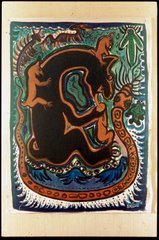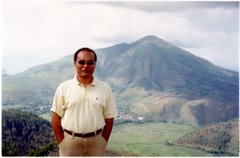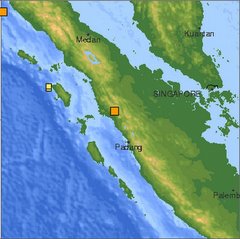
Title: Lubuk Larangan: community-based ecological resource management practise in Mandailing
(Foto: Erwin A. Perbatakusuma/CI)Abstract: The transitional period following the euphoria of ‘reformasi’ that sweep throughout Indonesia in the 1990s is marked by the collapsed of social cohesion which forms the basis of a harmonious society; instead it has led to the strengthening of suspicion in all sections of the Indonesian society. This phenomenon can be described as a deficiency in ‘social capital’. Social capital functions effectively when social relationship collaborates to create a collective cooperation in facing a common challenge.
Since independence in 1945, local communities in kabupaten (district of) Madina in the province of North Sumatra, in Indonesia, have been overseeing the implementation of the river protection (lubuk larangan) program. The origin of this program stems from the traditional concept of protected areas known as rarangan in the Mandailing language that is areas protected by adat (customary laws). The rarangan covers watershed, forested areas and grazing grounds.
The practice of lubuk larangan prohibits the harvesting of fisheries resources close to human settlements for a period of between 6 months to a year. Implemented in 70 settlements, the district of Madina has the largest river protection scheme in the province of North Sumatra. A small fee is charged to residents and visitors alike to catch the fishes. The income derived there from is in turn used to pay for the development of social facilities such as schools, roads and mosques, providing educational scholarships and administrative salaries, charity towards orphans, poor and invalids, etc.. The income generated by this community-based ecological resource management program benefits the community directly. In view of the current Indonesian economic and political situation, where remote communities can no longer count on the government for ‘development’ funding, the program instills confidence and financial self-reliance.
However, the rivers and watersheds are now facing two threats – illegal logging and pollution. The root causes of the destruction of habitats in Indonesia generally are corruption and weak local governance. Illegal logging carried out by national lumber companies, with the tacit collusion of the civil, police and military establishments, has ravaged the countryside. With increased consumption, pollution caused by the careless disposal of non-biodegradable domestic wastes, human wastes, and agricultural wastes, is degrading the water quality and river fisheries.
These activities have left an adverse impact on the watershed and consequently water quality and fisheries resources that the communities living in the area depend on. The well-being and health of the people living in the watersheds, as well as the benefits of the river protection scheme, are at stake. A process of re-education and visioning with the participation of the invigorated ‘village parliament' is in place to engage and promote participatory planning and decision-making to the newly constituted pemda (district authority); and ultimately strengthen the position of the Mandailing people as a stakeholder in national and regional development, which will allow them to better realize their options in the face of regionalism and globalization.
Mr Abdur-Razzaq Lubis
Mandaiilng All Clans Assembly
120 Armenian Street10200 Penang, Malaysia
Phone: +6 04 2633985Fax :+6 04 2633970
The Global Biodiversity Forum
http://www.gbf.ch/ab_received.asp?no=36&lg=EN&app=&now=1



No comments:
Post a Comment